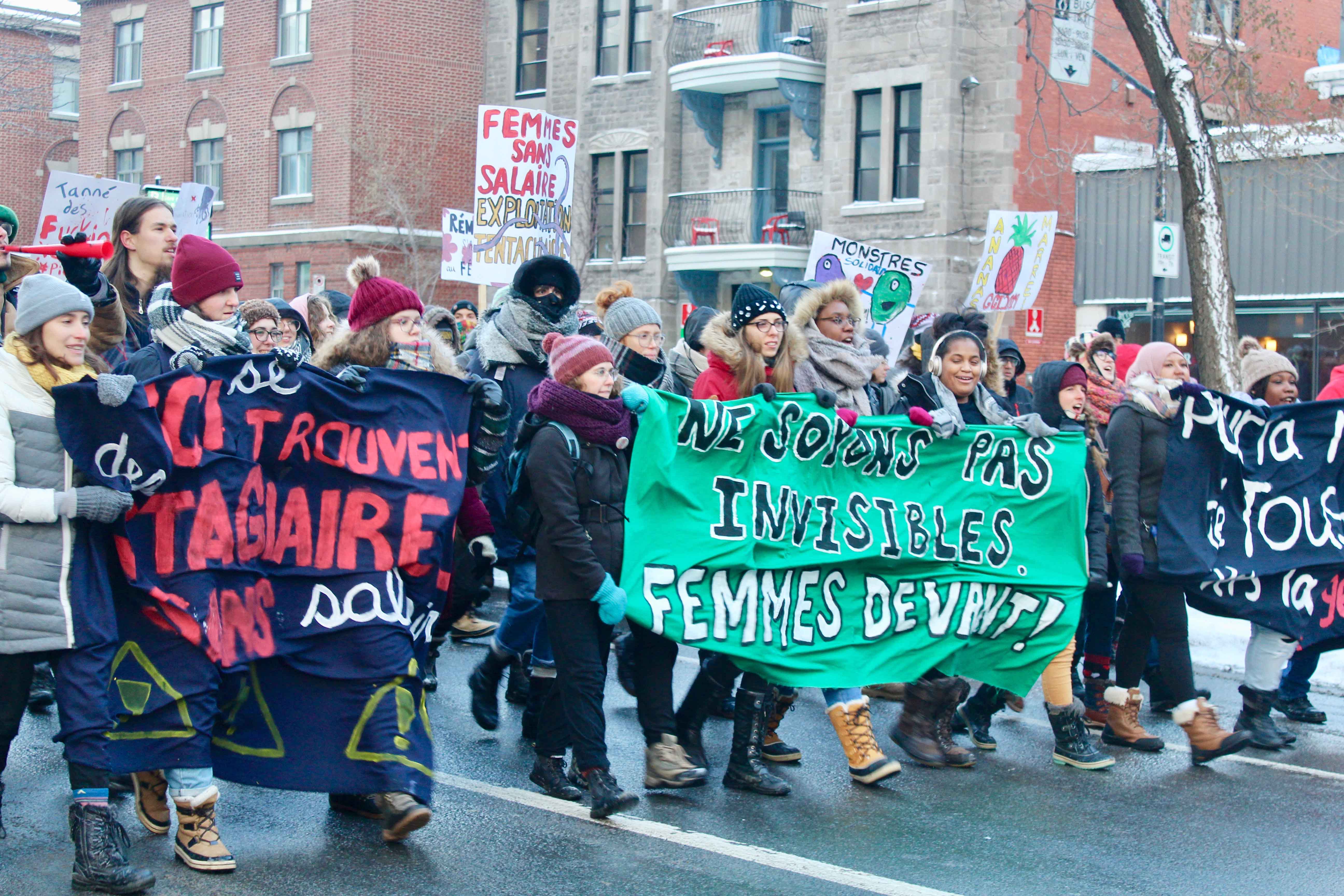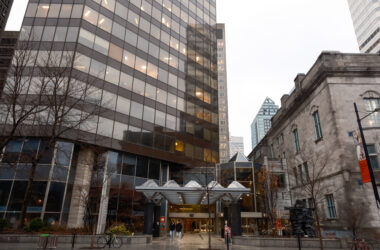The McGill Social Work Student Association (SWSA) went on strike Nov. 19-23 to protest mandatory unpaid internships in social work degrees. They joined over 50,000 CEGEP and university students demonstrating across the province. Currently, the degree at McGill requires two field placements, usually unpaid, in years U3 and U4, each consisting of 400 hours of labour in the social work field.
In comparison, similar internships in engineering or management are often compensated, as private sector organizations often operate for profit and receive Quebec government subsidies to fund interns and trainees. However, social work students’ placements typically take place in the public sector and remain uncompensated. For example, at the Université de Sherbrooke, 20 per cent of women-worked internships are paid while 47 per cent of men-worked internships are paid, pointing toward a trend of male-dominated professions being more likely to receive payment for internship requirements.
“The major issue we face with the McGill administration is the conflict that exists between their desire to preserve the status quo and ours to dismantle it,” Yasmin Weiss, the SWSA communications coordinator, said. “Recognizing and acting upon the overt injustice of unpaid internships has been met with bureaucratic opposition at a time when we require all the support we can get.”
Weiss criticized the administration’s refusal to allow social work professors to cancel classes during strike week. Professors had voted in favour of cancelling class in solidarity with the student protest, but the administration cautioned them of their legal obligation to teach.
“Teaching faculty support the concerns of the students, but we do have a requirement to teach classes, both as part of our legal requirements and with respect to the requirement [to provide instruction],” Nico Trocmé, director of the School of Social Work, said. “Any student who requests class is entitled to have class.”
This is not the first time that McGill students have organized around labour issues on campus. The Association of McGill University Support Employees (AMUSE) has previously gone on strike to protect its non-academic staff and floor fellows.
AMUSE is a McGill labour union that represents casual and temporary employees at the university, including both students and non-students in part-time and full-time positions. Its 1,500 members compose 55 per cent of McGill’s non-academic employees. AMUSE began collectivizing in Fall 2008, focusing on students participating in the work-study program. Non-student workers were eventually included, and, when the group voted in Fall 2009, 85 per cent favoured unionization. The Quebec Labour Board accredited AMUSE in Jan. 2010.
When the collective agreement between AMUSE and the university expired in Apr. 2015, the two parties began renegotiating the terms of employment as well as the rights and obligations of employers and employees, including wages, benefits, and non-monetary privileges. Among other requests, AMUSE pushed for a $15 minimum wage and for work-study positions to be posted publicly. However, McGill failed to implement their demands.
“The university has made it clear that they won’t include the changes that we feel are necessary for our members in the collective agreement,” Claire Michela, former president of AMUSE in 2016, said. “We tried all day to make a change that would suit our needs and be acceptable to the university, and we couldn’t do that, so we had to exercise our strike mandate at the end of the day, unfortunately.”
AMUSE voted to go on strike in Oct. 2016 to pressure McGill into reconsidering their demands. The five-day strike was instrumental in securing the wage increase for casual employees in their second collective agreement, ratified on Jan 30, 2017, although demands for a $15 minimum wage were not met.
Ella Hartsoe, current AMUSE President, blames society’s casualization of labour, the practice of making unionized, higher-paying jobs less protected and less benefitted. At McGill, she is also concerned about previously-unionized positions becoming non-union managerial positions.
“Casual workers who happen to be students are not ‘lucky’ for getting experience through working,” Hartsoe said. “They are working and being paid because it’s their right. Sometimes, jobs aren’t for resumes. Often times, for many working students on campus, jobs are for money, stability, and the autonomy that working brings for individuals who may not come from middle or upper-class backgrounds.”
Although they exist in a separate bargaining unit, floor fellows make up part of AMUSE as a result of a history of conflict with McGill. In 2008, then director of residences Michael Porritt was unwilling to consider the floor fellows’ judgment and opinions when they voiced their concerns over his no-tolerance drugs and alcohol policies. In 2012, two floor fellows were dismissed and then evicted for participating in #6party, a five-day protest occupation of the James Administration Building’s sixth floor in response to the university’s refusal to acknowledge the existence of CKUT Radio.
These events prompted McGill floor fellows to join AMUSE in May 2014, enabling them to negotiate with McGill administration for wage and job security as a part of their collective agreement. The negotiation process took over three years and the administration refused to pay the 75 floor fellows working in residences until July 3, 2017, when the floor fellows signed their first collective agreement with the university. Before then, floor fellows received only room and board. This resulted in increased job insecurity, as their living accomodations directly depend on their employment status. Floor fellows continue to only be compensated for an average work week of 13 hours, although they typically work for longer.
“I don’t want to say that it disincentivizes us to do work, but it’s just frustrating that our work isn’t appreciated by administration,” Stephanie Li, U2 Science, a Douglas Hall floor fellow, said. “They know that even if we’re not paid, we’re still going to be doing check-ins [and] we’re still going to be doing events.”
The McGill community itself relies on unpaid and underpaid workers. Tutoring services, the Sexual Assault Centre of the McGill Students’ Society (SACOMSS), the Peer Support Center, Walksafe, Drivesafe, and Nightline are all student-run services that do not offer even minimum-wage compensation for labour.
“Too much labour on campus is unpaid under the guise of ‘experience,’ but, as the Social Work students have pointed out, you can’t pay your groceries, rent, or tuition with ‘experience,’” Hartsoe said.









